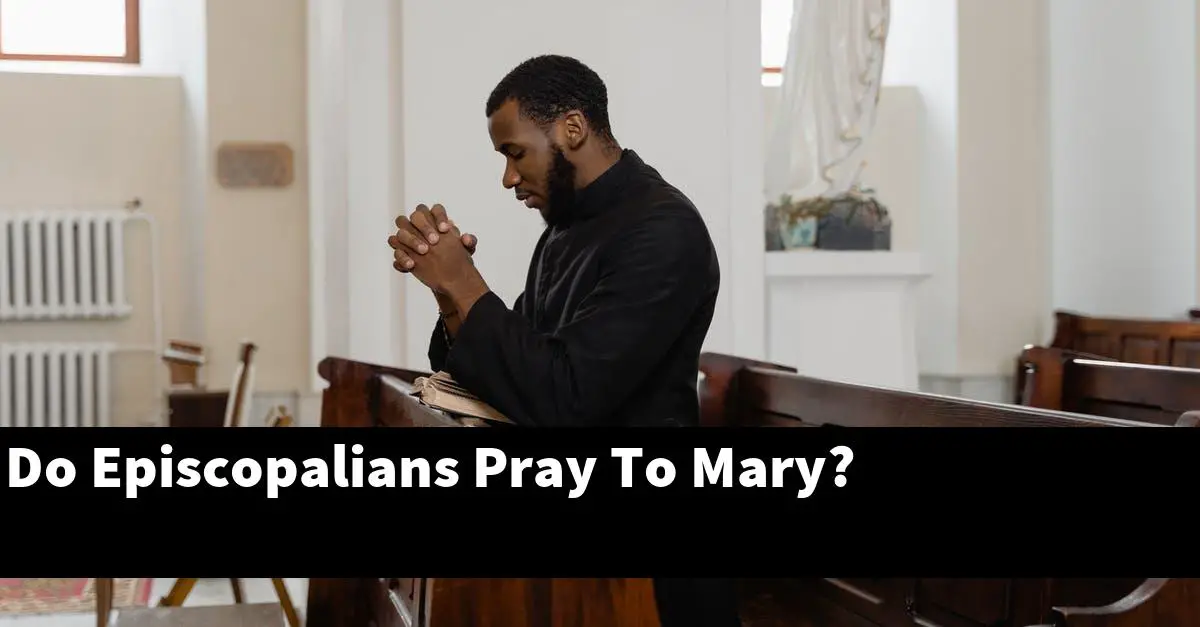The Episcopal Church is a mainline Protestant Christian denomination in the United States. In recent years, the Episcopal Church has been ordaining women and openly gay people as priests and bishops.
The Episcopal Church also affirms the use of the creeds, the Nicene Creed and the Apostles Creed. The Episcopal Church does not have an official stance on the praying to Mary, but many Episcopalians do pray to Mary.
Does Episcopal Church pray to Mary?
There is no universal agreement among Christian denominations on whether or not to pray to Mary, and Episcopalians are no exception. Some believe that prayers to Mary are acceptable, while others believe that they are not.
Ultimately, it is up to the individual congregation to decide whether or not they want to pray to Mary.
Do Episcopalians pray to saints?
There is some debate as to whether Episcopalians pray to saints, as the official church doctrine is that “saints are those whose lives and teachings inspire faith and repentance in people of all ages.” However, there is evidence that Episcopalians do pray to saints, as many Episcopal churches have altars dedicated to saints and chapels that often feature paintings or statuary of saints.
Can Episcopalians pray the rosary?
It depends on a number of individual factors, including the personal beliefs of the Episcopalians involved. Some Episcopalians may feel that the rosary is a prayerful and contemplative tradition that can be helpful in deepening one’s faith, while others may find the Catholic tradition of the rosary to be too religious and exclusive.
Ultimately, each individual may choose to pray the rosary in a way that is comfortable and personal for them.
Do Anglicans pray to the Virgin Mary?
There is no universal Anglican practice regarding prayer to the Virgin Mary, but there is a significant minority of Anglicans who advocate praying to her. There are a number of reasons why some Anglicans might advocate praying to the Virgin Mary, some of which include the belief that she is a holy intercessor and patroness of Anglicanism, and the belief that her prayers can be powerful and efficacious.
There is no universal Anglican practice regarding prayer to the Virgin Mary, but there is a significant minority of Anglicans who advocate praying to her. There are a number of reasons why some Anglicans might advocate praying to the Virgin Mary, some of which include the belief that she is a holy intercessor and patroness of Anglicanism, and the belief that her prayers can be powerful and efficacious.
Is the Episcopal Church Catholic or Protestant?
The Episcopal Church is Protestant. It separated from the Roman Catholic Church in 1534.
Can a Catholic take communion in an Episcopal Church?
It depends on the individual Catholic’s understanding of the sacraments and their obedience to the Church’s teachings. Generally speaking, Catholics are required to attend a Catholic church for sacraments.
However, there are a few exceptions to this rule, such as the sacrament of reconciliation, which is available to Catholics who have been baptized in a Protestant church and received the Eucharist there.
In general, Catholics are not allowed to receive communion in an Episcopal church. This is because the Episcopal church is a Protestant church, and Catholics are forbidden by the Church to receive communion in a Protestant church.
Do Episcopalians believe in Catholic saints?
There is no simple answer to this question as opinions vary among Episcopalians on this topic. Some Episcopalians believe that Catholic saints are venerated as holy individuals while others believe that Catholic saints are part of the official liturgy of the Episcopal Church and are therefore worshiped as such.
It is important to remember that each Episcopal bishop has the final say on whether or not Catholic saints are celebrated in the Episcopal Church.
Do Episcopalians believe in the Trinity?
The Anglican Communion is one of the world’s oldest and most complex Christian denominations. The Episcopal Church, which comprises about 2 million members worldwide, believes in the Trinity.
The term “Trinity” is derived from the Latin word “tres,” meaning “three.” The Father, the Son, and the Holy Spirit are all one in essence, but each has a unique role in the salvation of humanity.
What religion is closest to the truth?
There is no one right answer to this question as it depends on what you mean by “closest to the truth.” Some people might say that all religions are closer to the truth than others, while others might say that one particular religion is closer to the truth than the others.
Ultimately, it is up to the individual to decide which religion they believe is closest to the truth.
Are Episcopalians baptized or christened?
Episcopalians are baptized but not christened. Baptism is a symbol of faith and a way to invite God into a person’s life.
Christening is a Christian ceremony that marks the transition from infant baptism to full membership in the Christian community.
Is Episcopal similar to Catholic?
There are some similarities and differences between Episcopal and Catholic churches. For example, both churches use the Bible as their primary source of doctrine, but the Episcopal Church allows for wider interpretation of scripture than the Catholic Church.
Additionally, the Episcopal Church ordains women as priests, whereas the Catholic Church does not. Finally, the Catholic Church upholds the sacraments of baptism, confirmation, and Holy Communion, while the Episcopal Church does not.
Are there Episcopalian nuns?
There are Episcopalian nuns, though they are a minority within the Episcopal Church. In recent years, there has been an increase in the number of Episcopal nuns, as the Episcopal Church has begun to embrace the role of women in the church and in society.
Conclusion
No, Episcopalians do not pray to Mary. While they hold her in high esteem as the mother of Jesus, they do not believe that she is divine or that she can intercede on their behalf with God.

